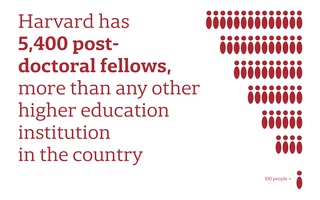Nearly 70 Harvard Medical School postdoctoral fellows, professors, and administrators signed a letter arguing that recent changes to the University’s health benefits plan may disproportionately burden Harvard postdocs, whose salaries are often lower than many other non-union employees'.
Little more than a week after they attended a town hall meeting on March 16 about the changes, a group of nine postdocs sent a letter to the University Benefits Committee and top Harvard administrators, including Provost Alan M. Garber ’76. In the letter, dated March 27, the postdocs criticized the new health benefits policy, arguing that it potentially increased unpredictable costs and financial burden on postdocs. The letter also called for the creation of a new advisory committee to the UBC, which recommended the recent policy changes that have prompted pushback from faculty members.
UBC Chair and Medical School professor Michael E. Chernew sent the group an email acknowledging that he received the letter. Chernew previously said the March 16 meeting made clear that postdocs “earn substantially less than faculty members in general, and they are concerned that the cost sharing that is imposed on them is particularly burdensome given their income level.”
The group has not heard back from the other administrators, according to two of the letter’s authors.
Kristin Krukenberg, a postdoc and one of the letter’s main signatories, said the benefits changes resulted in potential increased uncertainty and cost-sharing and argued that they harm the financial security of postdocs more than other non-union employees at Harvard, as their incomes are often lower.
“A lot of the concern is that the committee was not fully aware of the circumstances postdocs are in,” she said. “Even if premiums are higher, at least knowing what you have to pay is better.”
The recommended annual salary for Medical School postdocs begins at $42,000 for no years of experience and increases to $55,272 for seven years or more, according to the Medical School's website.
The postdocs' letter argued that offering a plan with more cost predictability is “critical to the financial survival of many low-paid employees,” including postdocs.
Rebeccah Lijek, another of the letter’s main signatories, said that despite her doctor’s recommendations, she chose not to seek physical therapy for a running injury because she cannot “sensibly” afford costs under the new healthcare plans.
“Given my salary as a Harvard Medical School postdoc and given the changes in the 2015 benefits plan, I can no longer sensibly afford that additional care, especially when I am trying to save for my retirement and am saving for a house,” Lijek said.
Signatories of the letter also called for the formation of a new committee comprised of “representatives from all levels of the Harvard employee community, including postdocs” to advise the UBC in creating its proposals.
Krukenberg said the signatories have reached out to other groups on campus, including the Harvard Union of Clerical and Technical Workers, to get their input on accommodating the plan to lower-income employees. She argued that alleviating the concerns of postdocs is difficult because of the temporal and disparate nature of the group.
“Maybe because it’s temporary, postdocs often feel isolated from the rest of the University community,” she said, “and the responsibilities are not at all standardized.”
The group also sent the letter in an email to Garber, Medical School Dean Jeffrey S. Flier, Vice President for Human Resources Marilyn Hausammann, Executive Vice President Katie N. Lapp, and Director of Labor and Employee Relations William J. Murphy.
UBC members have previously indicated that they are considering adopting some changes to the health benefits plan for 2016. When asked for comment, University spokesperson Jeff Neal wrote in a statement that "we and the members of the University Benefits Committee are very interested in hearing everyone’s views so that they all can be thoroughly considered as the UBC plans for the coming year."
—Staff writer Karl M. Aspelund can be reached at karl.aspelund@thecrimson.com. Follow him on Twitter @kma_crimson.
—Staff writer Meg P. Bernhard can be reached at meg.bernhard@thecrimson.com. Follow her on Twitter @meg_bernhard.
Read more in University News
Faculty for Divestment Brings Advocacy to ClassroomsRecommended Articles
-
No HeadlineThe letter which the captain of the foot ball team read last Tuesday evening at the meeting of the Harvard
-
University Benefits Committee Hosts Health Plan Info SessionThe closed event, hosted at the Center for Workplace Development on Mount Auburn Street, featured a question-and-answer session with UBC affiliates.
-
Health Benefits Plan Will ‘Likely’ Change in Future, Committee Members SayMembers of the committee that recommended controversial changes to Harvard’s non-union health benefits plan said it will likely change in the future.
-
No Affordable Childcare for PostdocsIn its benefits brochure for postdocs, Harvard proudly boasts that it “has invested over $10 million in child care infrastructure, and commits over $4 million per year to ongoing dependent care programs and services.” In reality, these facilities do not cater to the whole Harvard community, but mainly to the established who earn the salary that Harvard is not willing to pay its postdocs.
-
 Workhorses of the Lab
Workhorses of the Lab













